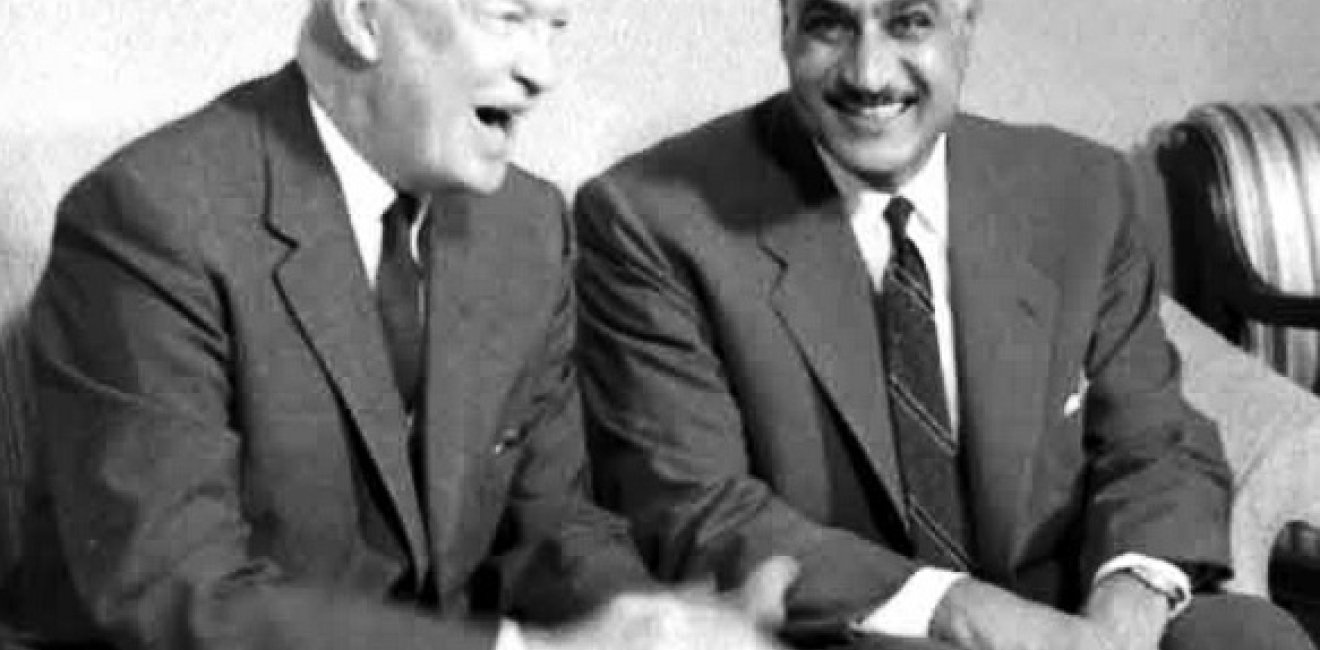After the Second World War, President Harry Turman's administration developed a strategy to block the spread of Soviet Communism into the Middle East and help maintain the flow of Middle Eastern oil to the West. Often referred to as the Postwar Petroleum Order (PPO), the policy changed frequently from administration to administration, but the overall goal remained: containment of Soviet Communism. However, differences between Lyndon Johnson and Gamal Abdel Nasser would lead to the collapse of the PPO.
Egypt, with its strategic location in northeast Africa, would play the key role in the PPO. Egypt's Suez Canal was the lifeline of European access to Persian Gulf oil. However, two major regional issues challenged the stability of the PPO: the Arab-Israeli Conflict, which began with the creation of Israel in 1948; and the Free Officers' Revolution in 1952 that transformed Egypt from a conservative monarchy to a progressive republic.
The Arab-Israeli conflict became the first test for the PPO. In 1948, Zionists in Palestine established the state of Israel. The creation of a Jewish state in the heartland of the Arab world challenged the notion of Arab unity and Israel became the antithesis of Arab nationalism, a movement that argued for the unity of the Arab world from Morocco to the Persian Gulf and the establishment of a united Arab republic. Arab-Israeli friction has led to five major wars between the Arab states and Israel since 1948. The ongoing conflict continuously threatened the stability of the region and the collapse of the PPO.
The second obstacle to the PPO arose with the establishment of the Arab Republic of Egypt in 1952 under the leadership of Gamal Abdel Nasser, an Egyptian army colonel who led the Free Officers' Movement and deposed King Farouk. Nasser's Egypt not only actively opposed Israel's existence - further complicating the Arab-Israeli conflict - but Nasser also joined the Nonaligned Movement, an organization that formed a neutral bloc in the Cold War by not aligning with either superpower. From 1952 to 1958, relations between the United States and Egypt became turbulent with alternating periods of cooperation and disagreement.
In 1959, President Dwight D. Eisenhower decided on a policy shift. Eisenhower decided that working against Nasser obstructed the successful implementation of the PPO. Eisenhower's policy shift toward Egypt redefined American-Egyptian relations. Using the lessons of the past, Eisenhower focused on keeping Nasser satisfied by flooding American economic aid into Egypt in hopes that this would guarantee Nasser's cooperation.
John F. Kennedy built on Eisenhower's strategy of working with, rather than against, Nasser through an "Egypt first" policy, identifying Egypt as key to defeating Communism in the Middle East and North Africa. Kennedy then attempted to contain the Arab-Israeli conflict through the "ice box" strategy, a plan to help set aside differences between the Arabs and Israel by concentrating on their mutual interests, such as the containment of communism in the region. Kennedy's policymakers believed these two measures would lay the foundations for larger American objectives in the PPO, which was to contain Soviet influence in the Middle East.
When Lyndon B. Johnson took command after Kennedy's assassination, the PPO was made up of several components, such as Egyptian-American cooperation, containment of communism in the region, and diplomatic efforts to limit the Arab-Israeli conflict. Johnson, however, found it difficult to deal with Nasser due to the Egyptian leader's nonaligned commitments. Additionally, Johnson's security interests in the region entangled his administration in Arab politics and the Arab-Israel conflict. When Nasser intervened in the Yemeni civil war in late 1962, Johnson concluded that Nasser's meddling threatened the stability of the PPO.
Sensing that Egypt's involvement in the war had backfired and significantly reduced Nasser's influence over the Arab world, Johnson inadvertantly undermined the Egyptian president by enlisting the conservative Arab regimes (i.e. Jordan, Saudi Arabia, Yemen, and Libya) to replace Egypt as the fulcrum of the PPO.
Recently revealed documents show that the collapse in American-Egyptian relations took place at a crucial moment for Nasser. Similar to Johnson confronting his political enemies while dealing with the war in Vietnam, Nasser confronted his political enemies at home and abroad, especially in the Arab world and in Yemen. Challenged for leadership of the Arab world by Saudi Arabia and its unofficial conservative alliance (with the Gulf States, Jordan, and Libya) Nasser also had to contend with competition for control of the Arab nationalist movement from the progressive Ba'athists in Syria, who argued for opposition to Western imperialism and promotion of National Socialism. Nasser's desperation during this time, and the breadown in Egyptian-American relations contributed greatly to the May Crisis in 1967 - the crisis that led to the Six-Day War.







